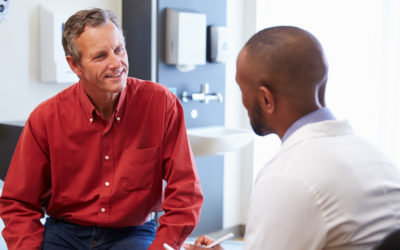Cystoscopy
Our urologist specializes in cystoscopy, a simple procedure to diagnose, monitor and treat conditions affecting the bladder and urethra (the tube that carries urine out of the body). We can often perform this short procedure right in the office, with fast results so you can get peace of mind and back to good health.
To schedule your appointment with a specialist right here in Mt. Vernon, call (618) 244-6710.
About the Procedure
During cystoscopy, your Crossroads urologist uses a small scope to examine the inside of the bladder and urethra for any abnormalities. The instrument has a tiny lens with a light on the end, allowing for an up-close view on nearby video monitors. Water or saline is also infused through the cystoscope, inflating the bladder to make all areas easier to see.
The procedure may be recommended for a variety of reasons, such as:
-
Assessing symptoms: Helps your doctor determine what may be causing problems like blood in the urine, painful urination, incontinence, an overactive bladder or frequent urinary tract infections (UTIs).
Making a diagnosis: Used to identify various bladder diseases, including bladder stones, inflammation or cancer, as well as an enlarged prostate.
Treating a condition: Special tools can be passed through the cystoscope to perform a number of procedures, including removing small bladder stones or tumors, stopping internal bleeding or injecting medication to treat urinary leakage.
A simple cystoscopy usually only takes five to 10 minutes, performed in the office using a local numbing jelly in the urethra to help prevent any pain. Depending on your specific condition, the procedure may take a little longer and require the operating room, with sedation or general anesthesia options to keep you as comfortable as possible.
Results are often available right after the procedure, though it may take a few days if your doctor collects tissue (biopsy) for lab testing.
Recovery & Follow-Up Care
Cystoscopy is generally a very safe procedure, and complications rare.
You should be able to go home the same day as your cystoscopy, usually immediately after if a local anesthetic was used. If you were sedated, you’ll be taken to a recovery area for a brief time, where our care team will monitor you as the anesthesia wears off. A friend or family member will need to drive you home, and you will both receive special instructions for at-home care, including any prescriptions.
In the hours following your procedure, you may experience some mild discomfort or side effects, including an increase in urinary frequency, a burning sensation during urination or mild bleeding.
If those issues persist, or you experience any problems, such as severe abdominal pain, chills or fever, call your doctor or seek medical attention right away.
Schedule an Appointment
Call 618-244-6710
Related Services and Conditions
Urology
Helping you get the most out of life Urology services at Crossroads Community Hospital focus on the urinary tract and system, including the bladder and kidneys, of both men and women, as well as the male reproductive organs. Urology specialists work closely with...
Erectile Dysfunction
Impotence, or erectile dysfunction, is the inability to achieve an erection and/or dissatisfaction with the size, rigidity and/or duration of erections. According to the National Institutes of Health (NIH), erectile dysfunction affects up to 30 million men. Although...
Laser Lithotripsy for Kidney Stones
Living with kidney stones can be quite painful. But with newer, minimally invasive treatments, removing them doesn’t have to be. The urologist at Crossroads Community Hospital specializes in laser lithotripsy – an incision-free procedure that uses a laser to break...
Prostate Cancer
More than 90 percent of all prostate cancers are discovered while they are either localized (confined to the prostate) or regional (nearby). The five-year survival rate for men diagnosed with prostate tumors discovered at these stages is nearly 100 percent. In the...
Sling Surgery for Incontinence
If you’re like the millions of Americans living with urinary incontinence, we know how disruptive it can be to your life and peace of mind. That’s why Crossroads offers everything you need to take control. Our urologist specializes in the newest techniques, including...
Urinary Tract Infections
UTIs are infections of the bladder and urethra that disproportionally affect older adults because of their vulnerability to develop a weakened immune system. Mobility limitations that may prevent good hygiene, and medical conditions, such as diabetes, kidney stones or...
Vasectomy
A vasectomy is a very effective way of preventing future pregnancies. The procedure can be done under local anesthesia and is considered to be very safe. During the procedure, the urologist makes a small incision and cuts, ties, or blocks the vas deferens. After this,...







